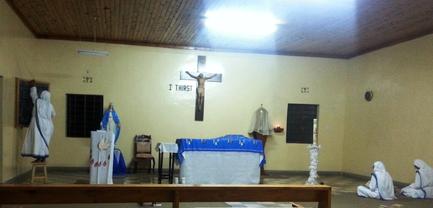 MC Sister's chapel in Nairobi, where Fr Illo is giving his retreat talks
MC Sister's chapel in Nairobi, where Fr Illo is giving his retreat talks It made me think: thousands of monkeys in the middle of Nairobi, and no one knows their names. But certainly God knows them. “Not a sparrow falls without your Father knowing it.” In this park, in addition to the monkeys, were hundreds of Kenyans and at least one American. Each of us has a mother, and each one’s mother knows us.
I gave a talk to the sisters last night on Our Lady and the Eucharist (the retreat is on Our Lady, roughly following the 20 mysteries of the rosary). I have to make the sisters laugh a bit, so I told them about the monkeys. If God loves the monkeys, He loves us too, and that’s why He gave us His Holy Mother, to feed us the Bread of Life. Here is a bit of what the sisters heard last night.
Our Lady was not at the Last Supper. One reason was that Christ held this Supper for his Apostles, to ordain them for the Eucharist. She was not called to be a priest; her role, like that of Mother Teresa, was not to bring the Eucharist to the people, but to bring the people to the Eucharist. Mother Teresa brought the love of Jesus into the dark holes of the poor, where the priests could not go. When the poor had received the love of Jesus in their hearts, then she would bring the priest to give them the love of Jesus in their bodies. Then she would call the priest, who would hear their confessions and give them the Eucharist.
Another reason Mary was not at the Last Supper was that she had already received her First Holy Communion, which the Apostles were to receive that night. She had already received Jesus when she had said her “Fiat” (or in Hebrew “Amen”) to the angel Gabriel at the Annunciation. Also, while Jesus gave Himself to the apostles veiled under sacramental signs, Our Lady had received Him in the fullness of his physical reality. Hers was the world’s first First Holy Communion, and the only reception of the Eucharist “unveiled,” not as bread but as a baby in her womb. She knew the Eucharist “face to face;” she nursed Him, and spoke with Him, and loved Him as her child.
But to receive that First Eucharist, Jesus’ Mother first had to say an unconditional “yes” to God’s will. We call it her Fiat, from the Latin “let it be done [according to your will],” but this simple village girl didn’t speak Latin. She probably said the Hebrew word Amen. That means something like “so be it” or “yes, of course!” or “be it done!” That was Our Lady’s vow of consecration to God; she said it once, and she renewed her total surrender every day. You too, dear sisters, say “Amen” every day, before receiving Jesus Christ, and when you say it, you are renewing your vows. Mary made one vow, but you have made six baptismal vows and four religious vows. All our vows, however, come down to one word: “Amen.” We say it before receiving Holy Communion, and we say it with Our Lady. Every time you say Amen to the Eucharist you renew your vows, and you strengthen the joy of living those vows. Your vows are enclosed within the one vow of our Lady: “be it done to me as you have said.” So do not be afraid of keeping those vows, and knowing the love of Jesus in your hearts. God receives your Amen as He received our Lady’s Fiat. He knows you as he knows her, and he stays in your heart, as long as you keep saying Amen to the Holy Eucharist.


 RSS Feed
RSS Feed